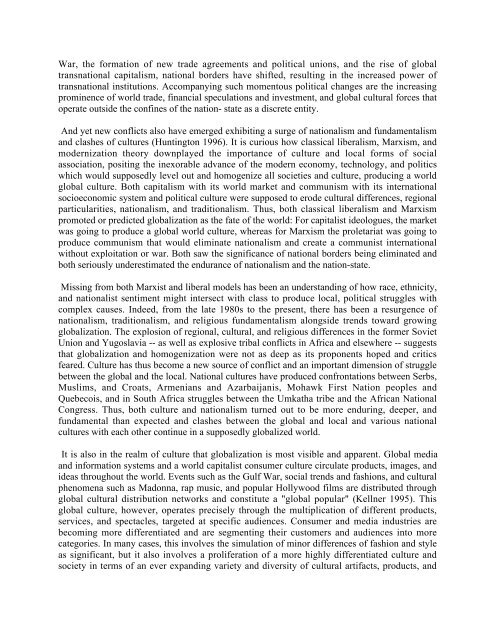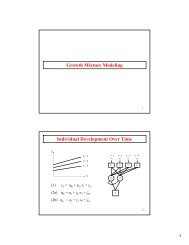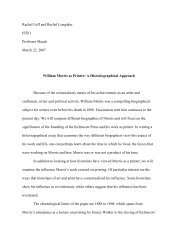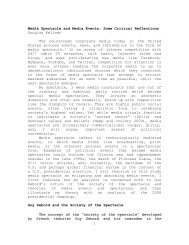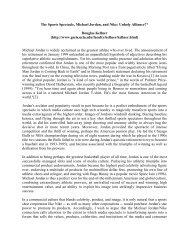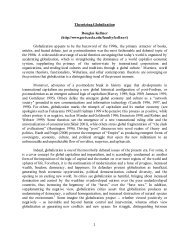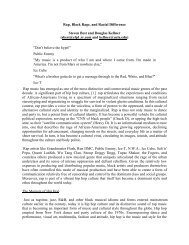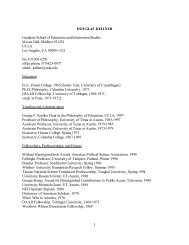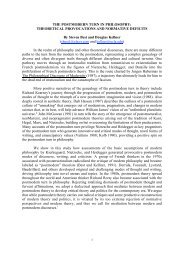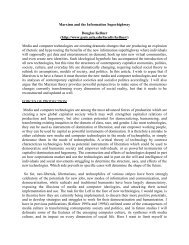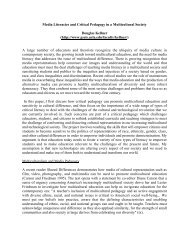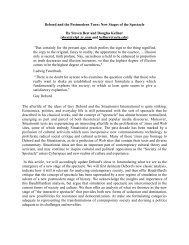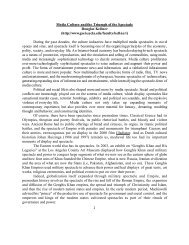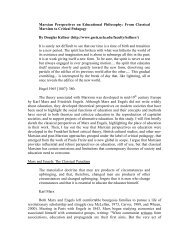Globalization and the Postmodern Turn By Douglas Kellner ... - UCLA
Globalization and the Postmodern Turn By Douglas Kellner ... - UCLA
Globalization and the Postmodern Turn By Douglas Kellner ... - UCLA
Create successful ePaper yourself
Turn your PDF publications into a flip-book with our unique Google optimized e-Paper software.
War, <strong>the</strong> formation of new trade agreements <strong>and</strong> political unions, <strong>and</strong> <strong>the</strong> rise of global<br />
transnational capitalism, national borders have shifted, resulting in <strong>the</strong> increased power of<br />
transnational institutions. Accompanying such momentous political changes are <strong>the</strong> increasing<br />
prominence of world trade, financial speculations <strong>and</strong> investment, <strong>and</strong> global cultural forces that<br />
operate outside <strong>the</strong> confines of <strong>the</strong> nation- state as a discrete entity.<br />
And yet new conflicts also have emerged exhibiting a surge of nationalism <strong>and</strong> fundamentalism<br />
<strong>and</strong> clashes of cultures (Huntington 1996). It is curious how classical liberalism, Marxism, <strong>and</strong><br />
modernization <strong>the</strong>ory downplayed <strong>the</strong> importance of culture <strong>and</strong> local forms of social<br />
association, positing <strong>the</strong> inexorable advance of <strong>the</strong> modern economy, technology, <strong>and</strong> politics<br />
which would supposedly level out <strong>and</strong> homogenize all societies <strong>and</strong> culture, producing a world<br />
global culture. Both capitalism with its world market <strong>and</strong> communism with its international<br />
socioeconomic system <strong>and</strong> political culture were supposed to erode cultural differences, regional<br />
particularities, nationalism, <strong>and</strong> traditionalism. Thus, both classical liberalism <strong>and</strong> Marxism<br />
promoted or predicted globalization as <strong>the</strong> fate of <strong>the</strong> world: For capitalist ideologues, <strong>the</strong> market<br />
was going to produce a global world culture, whereas for Marxism <strong>the</strong> proletariat was going to<br />
produce communism that would eliminate nationalism <strong>and</strong> create a communist international<br />
without exploitation or war. Both saw <strong>the</strong> significance of national borders being eliminated <strong>and</strong><br />
both seriously underestimated <strong>the</strong> endurance of nationalism <strong>and</strong> <strong>the</strong> nation-state.<br />
Missing from both Marxist <strong>and</strong> liberal models has been an underst<strong>and</strong>ing of how race, ethnicity,<br />
<strong>and</strong> nationalist sentiment might intersect with class to produce local, political struggles with<br />
complex causes. Indeed, from <strong>the</strong> late 1980s to <strong>the</strong> present, <strong>the</strong>re has been a resurgence of<br />
nationalism, traditionalism, <strong>and</strong> religious fundamentalism alongside trends toward growing<br />
globalization. The explosion of regional, cultural, <strong>and</strong> religious differences in <strong>the</strong> former Soviet<br />
Union <strong>and</strong> Yugoslavia -- as well as explosive tribal conflicts in Africa <strong>and</strong> elsewhere -- suggests<br />
that globalization <strong>and</strong> homogenization were not as deep as its proponents hoped <strong>and</strong> critics<br />
feared. Culture has thus become a new source of conflict <strong>and</strong> an important dimension of struggle<br />
between <strong>the</strong> global <strong>and</strong> <strong>the</strong> local. National cultures have produced confrontations between Serbs,<br />
Muslims, <strong>and</strong> Croats, Armenians <strong>and</strong> Azarbaijanis, Mohawk First Nation peoples <strong>and</strong><br />
Quebecois, <strong>and</strong> in South Africa struggles between <strong>the</strong> Umkatha tribe <strong>and</strong> <strong>the</strong> African National<br />
Congress. Thus, both culture <strong>and</strong> nationalism turned out to be more enduring, deeper, <strong>and</strong><br />
fundamental than expected <strong>and</strong> clashes between <strong>the</strong> global <strong>and</strong> local <strong>and</strong> various national<br />
cultures with each o<strong>the</strong>r continue in a supposedly globalized world.<br />
It is also in <strong>the</strong> realm of culture that globalization is most visible <strong>and</strong> apparent. Global media<br />
<strong>and</strong> information systems <strong>and</strong> a world capitalist consumer culture circulate products, images, <strong>and</strong><br />
ideas throughout <strong>the</strong> world. Events such as <strong>the</strong> Gulf War, social trends <strong>and</strong> fashions, <strong>and</strong> cultural<br />
phenomena such as Madonna, rap music, <strong>and</strong> popular Hollywood films are distributed through<br />
global cultural distribution networks <strong>and</strong> constitute a "global popular" (<strong>Kellner</strong> 1995). This<br />
global culture, however, operates precisely through <strong>the</strong> multiplication of different products,<br />
services, <strong>and</strong> spectacles, targeted at specific audiences. Consumer <strong>and</strong> media industries are<br />
becoming more differentiated <strong>and</strong> are segmenting <strong>the</strong>ir customers <strong>and</strong> audiences into more<br />
categories. In many cases, this involves <strong>the</strong> simulation of minor differences of fashion <strong>and</strong> style<br />
as significant, but it also involves a proliferation of a more highly differentiated culture <strong>and</strong><br />
society in terms of an ever exp<strong>and</strong>ing variety <strong>and</strong> diversity of cultural artifacts, products, <strong>and</strong>


